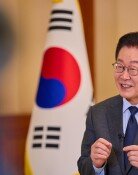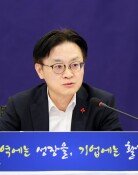Interview with Korean ambassador to U.S.
Interview with Korean ambassador to U.S.
Posted September. 21, 2000 20:55,
The reporter met with Korean Ambassador to the United States Yang Sung-Chul, who came to Seoul to participate in the Korea-U.S. Security Consultative Meeting (SCM) at the Hilton Hotel Thursday. He seems to be full of confidence now compared to the days before his departure for Washington to assume his post. He expressed views on inter-Korean issues as well as bilateral Korea-U. S. questions.
Q: Have the relations between Seoul and Washington been developing differently since the inter-Korean summit talks?
A: Prior to the inauguration of President Kim Dae-Jung's "government of the people" in 1998, the United States was in a position to promote an engagement policy with North Korea and the South was putting the brakes on it. But now, Korea is taking the lead with the engagement policy and the inter-Korean relationship is fast developing, while Washington is following Seoul's lead in this regard. It appears that there are some differences in their positions, but actually they are doing well with prior consultations and policy coordinations. But there is the possibility that the relations between Pyongyang and Washington will move ahead of inter-Korean engagement in the future.
Q: What do you mean by U.S.-N.K. relations going ahead?
A: If the U.S. and the North make good progress in their bilateral negotiations on the missile and terrorism issues as well on diplomatic rapprochement, the improvement of their relations could develop rapidly. However, in view of the fact that Seoul-Washington relations are highly important, their developments in their respective bilateral relations should be promoted in a framework that will not damage traditional Seoul-Washington ties.
Q: Aren't there some worries that if Pyongyang speeds up rapprochement with both Seoul and Washington simultaneously, this would adversely affect U. S.-South relations?
A: This possibility is being studied by Seoul and Washington. But most important is that Pyongyang comes to understand the genuineness of the engagement policy with the North.
Q: Isn't the U. S.-NK relationship important for inter-Korean ties?
A: North Korea must change itself. The North should adopt a forward-looking posture toward the issue involving its hijacking of a Japanese airliner, Yodo. The question stands in the way of the improvement of ties between the U. S. and the North. It is Pyongyang that must resolve the question.
Q: How should issues involving the U.S. -- for example, the Korea Status of Forces Agreement (SOFA) and Nogeun-ri massacre incident -- be resolved?
A: The Seoul government has proposed to address the environmental and labor problems in the SOFA revision and the U.S. side is positive toward this proposal. As for the issue of criminal jurisdiction, there is room for mutual compromise. The Nogeun-ri incident is expected to be settled smoothly before long.
Q: What do you think about the Korean people's anti-American sentiment?
A: Anti-American sentiment and criticism of the U.S. government's policies should be distinguished. The anti-U.S. feelings for the present are different from those in the 1980s. I think that the present moves are aimed at American policy matters and not serious enough to worry about.
Q: What is the American view of Korean politics?
A: I hope that domestic politics are productive. The Americans regard Korea as ranking within the top ten countries of the world in every aspect and as the most democratic nation in Asia. The Koreans may well be proud of this. But politics today is deplorable, and is doing itself injury.






![반찬통 착색 고민 끝…‘두부용기’ 버리지 말고 이렇게 쓰세요 [알쓸톡]](https://dimg.donga.com/c/138/175/90/1/wps/NEWS/IMAGE/2026/01/09/133126593.3.png)
